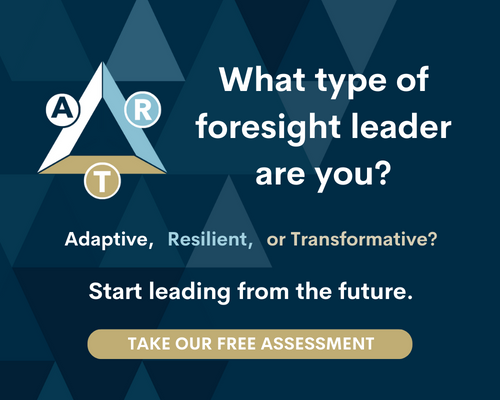Redefining Value for 2023

An excerpt from the Guide to the Natural Foresight® Framework
According to a recent study, organizations that intentionally plan for the future outperform their peers in terms of profitability and overall valuation (Rohrbeck & Kum, 2018). The result seems intuitive to most, yet “just one in five companies strategically prepares itself for future movements in the market – and just one in 20 companies adjusts its course of action accordingly” (“Corporate Foresight Improves”, 2018, par. 3). The future moves faster than we might expect, especially in today’s landscape of exponentially increasing complexity. The Kondratiev and Gartner cycles that were used to forecast economies and predict technological hype don’t work nearly as well as they did in a previous era, and the “laws” of complexity and exponential emergence don’t fit nicely into our Industrial Age models. That’s why outdated systems of legislation, economics, government, and policy can’t match the speed of blockchain, the Internet of Things, AI, or the expanding web, as well as the social shifts that proceed or stem from these developments. Today’s super accelerated, volatile environment demands that we define, design, refine, and reframe our strategies, outcomes, and actions. Rather than relying on our antiquated, quantitative-based approaches, what if we fueled our organizations, institutions, systems, and leaders with foresight?
What if we fueled our organizations, institutions, systems, and leaders with foresight?
The Guide to the Natural Foresight® Framework
Through Strategic Design, a holistic approach to foresight integration, the Create Phase of the Natural Foresight® Framework seeks to address the disconnect between our outdated systems and the turbulent externalities causing them to fail at an unprecedented rate. Recognizing that Band-Aid approaches will not work, we need a roadmap for updating our organizational and personal operating systems for success in a new era. Ultimately, success with Strategic Foresight requires that we democratize the future intentionally, actively distributing the future faster and embedding it everywhere. Creating a culture of future thinkers means everyone must be empowered with the tools to understand and create the future for themselves and their communities, embracing not only lifelong learning, but unlearning and relearning as well.
Defining value
In order to democratize and co-create the future, we must address and integrate a shift in value generation. The ideas that have historically guided what we value — hierarchical structures, top-down governance, segmented industries, intellectual property, personal ownership, etc. — are becoming increasingly irrelevant. The hyper-focus on efficiency, productivity, economies of scale, and mass consumption as a means to create value has cemented systems and structures that have largely neglected a generative and human centric worldview in favor of a more mechanistic approach. However, trends in society, technology, and the economy are all converging in unexpected ways, forever changing how people view the world and their respective role in it. To thrive, modern organizations must cultivate and embrace new pathways to value creation that align with the characteristics of an era that is characterized by chaos, complexity, and contradiction.
In an attempt to define the exponential change that is reframing our traditional operating systems and social structures, sociologist and futurist Ziauddin Sardar coined the phrase “Postnormal Times.” Based on the concept of post-normal science — in which facts and values are constantly in flux — Sardar’s framework captures the unique aspects of the ambiguous and shifting world in which we find ourselves. As described by Professor Sardar (2010), Postnormal Times are an “in-between period where old orthodoxies are dying, new ones have yet to be born, and very few things seem to make sense” (p. 435-444). Most organizations today have spent considerable time and resources to ensure that they can successfully create (or at least sustain) value in an environment characterized by innovation and disruption. However, very few are prepared for a world in which the concept of value itself is completely redefined:
- Postnormal Value Creation is Future Empowered. As we accelerate toward a new world of education, work, and community, the present day definition of value that stems from short-term agendas, incremental development, and historical forecasting is becoming just as antiquated as the system for which it was coined. We must learn to pull from the future to create robust value in the present. In a world that is being rapidly reshaped by networked matter, artificial intelligence, and digital lifestyles, creating value requires an emphasis on foresight rather than hindsight
- Postnormal Value Creation is Organic and Complex. Beyond recognizing that an increasingly complex environment is a natural and organic sign of maturity, researchers and professionals alike are realizing that complexity is the seedbed of unlimited human creativity. This generative idea reframes our view of complexity from being a force that opposes progress to one that enables us to unearth creative solutions to our greatest challenges. Much like an ever-growing canvas, accelerating complexity is giving us more space on which to paint an unending series of unique masterpieces.
- Postnormal Value Creation is Intangible. The past several years have seen the dominance of intangible companies such as Uber (which owns no physical fleet of cars), Airbnb (which owns no physical properties), and Facebook (which creates no content) — but the bigger potential for impact exists around the growing intangibility of every single person on the planet. As tangible value takes a backseat to intangible benefits, the hard skills we have craved for so long are giving way to skills such as sensemaking, creativity, and empathy.
Download your free copy of The Guide to the Natural Foresight® Framework here:

